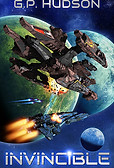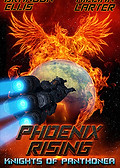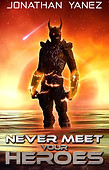My First Time in Virtual Reality

Photo by Christian Fregnan
Yesterday, it struck me that I was due to write an article to be posted on the Sci-Fi Reads blog today.
Yet, I had a problem: it was the day after the 20Booksto50k indie author conference in Las Vegas, and I was busy hanging out with fellow sci-fi author and Sci-Fi Reads founder Christian Kallias.
We had other things to do, things that left no time for blogging – things like seeing the Joker at the Orleans casino theater, and blowing past our gambling budgets for the trip (okay, I blew past my gambling budget for the trip).
That’s how I found myself sitting this morning in the Toronto Pearson Airport, after snatching three hours of spotty sleep on a red-eye flight from Las Vegas, with a blog post due and nothing written.
But what to write about? Come to think of it, I could have embarked on a post about the Joker, but that didn’t occur to me at the time. Now that I’m on the topic, though, I quite liked the movie. Joaquin Phoenix was perfectly cast, and the movie was suitably unsettling.
It didn’t occur to me to write about the Joker, though, and I think I know why. You see, nestled inside my carry-on bag was a new Oculus Go – the VR headset Christian had so generously given me during the trip.

What I really wanted was to find an excuse to play it. That’s when it struck me that I could kill two Stormtroopers with one blaster bolt, if you’ll pardon the contrived expression.
I would try out the Oculus Go, then write about my first experience with VR. Brilliant! I yanked the headset from the bag and put it on.
There I was, sitting outside the gate from which my flight would depart in a couple hours, my carry-on tucked between my knees as I looked around at the panoramic main menu suspended in space before me. To my fellow passengers, I was a strange, twitching man, swinging my head this way and that in response to invisible stimuli, a plastic gray device strapped to my eyes like a time traveler from a bad eighties movie.
At least, that’s how I assume I looked. But please, feel no sympathy for me, dear reader. This is merely one example of the sacrifices we sci-fi authors make for your entertainment.
Anshar Wars 2

First, I booted up Anshar Wars 2, a space opera game in which you control a starfighter by moving your head. You shoot using the single controller, which I held in my right hand. Your weapons include lasers, missiles, EMP blasts, and presumably other things as you progress past the second mission, which I didn’t.
The game’s story was something to do with a species that looked a lot like humanity, which despite a lot of infighting managed to make it to other planets, where the infighting continued. But the colonies united when a mysterious alien threat emerged.
That’s what I got from it, anyway. I couldn’t find a headphone jack on the headset, meaning my fellow travelers were subjected to the game’s sounds as well as my spastic head twitching. For that reason, I kept the volume as low as I reasonably could, and I missed a fair bit of the dialog because of announcements over the airport PA system.
It occurred to me that the game’s plot wasn’t so different from one of my own space opera books, though I pray that I do dialog and characterization better than Anshar Wars does.
Honestly, I don’t play games for the writing, and Anshar Wars 2 is fun enough from a gameplay perspective. The objectives are standard sci-fi fare. Mission 1: escort the mother ship to the jump gate. Mission 2: kill mining drones, collect the energy they drop, use the energy to execute an EMP blast in order to disable a space station’s turrets, destroy those turrets, then take out its power sources.
I wasn’t a big fan of using my head to control the ship. Maybe I would have been if the ship took sharper turns, but I found that turning around meant flying to the edge of the map, where the game would automatically point my starfighter in the opposite direction. No matter how I craned my neck, I could find no other way to steer toward my foes.
Racket Fury

After completing Anshar Wars 2’s second mission, I quit the game and selected Racket Fury from the floating menu. In this game, I played ping pong with a legless robot, who would float around his end of the table and return the ball with effortless ease.
At least, that’s what happened in Practice mode. The bot and I volleyed until I screwed up. He never seemed to screw up.
We played in a bright, spacious atrium, while another robot – a flying manta ray – looked on from above.
In Practice mode, the ball only ever seemed to go cross-table, meaning I only ever got to practice my backhand.
Also, the robot didn’t seem invested in the game at all. He never celebrated when he won a rally. I found that a little disconcerting – the casual ease with which the machine was dominating me.
So far, Racket Fury wasn’t showing me a very good time, but in the name of having more content to inject into this blog post, I soldiered on. Returning to the game’s menu, I selected tournament mode.
Here, things changed. For one thing, it was possible to hit the ball to any part of the robot’s side now, and not just cross-table. For another, the robot could actually screw up, though he still didn’t do that very often.
Whenever I did succeed in getting a point off him, the sound of cheering would play – except, there was no crowd present in the atrium to cheer. I can only assume the robot manta ray was the one cheering. I think he liked me.
Most striking of all were the robot’s reactions. Now, he was invested in the game, and at first, he celebrated his victories, pumping a metal fist in the air. On the rare occasion that I won a point, he became visibly frustrated.
But very quickly, he began showing frustration whenever I messed up, too. It was as though he was disappointed in my playing – as though his fleshy meat sack of an opponent was wasting his time with sub-optimal performance.
I wanted to tell him that I felt sorry inefficient evolution had left me so woefully prepared to match him in virtual reality ping pong, but I had to assume he couldn’t hear me, and I also had to assume that if I said it, the people around me would think I was even odder than they already did.
So we played on, and I seemed to improve. I took the second game from the robot, though it was a near thing. He won the third game, and along with it, the match.
So much for humanity.
Conclusions
After being shown the inadequacy of my organic existence, it was time to board my flight to Halifax, and I decided to spare my neighbor the frenetic head gyrations VR seems to require. As such, it’s time to wrap up this blog post.
I did get a chance to check out the environments in VR chat, as well as the virtual theater where you watch movies. Those are really cool – it’s like you can reach out and touch the environments.
Christian tells me we can meet to talk about books and play chess in the back of a spaceship, and I’m looking forward to that.
I’ve wanted to check out VR for a while, and now that I finally have, I feel like I’ve joined the future. I can’t wait to play more games and see what’s next for the technology.
Find Scott Bartlett’s space opera novels here.




























